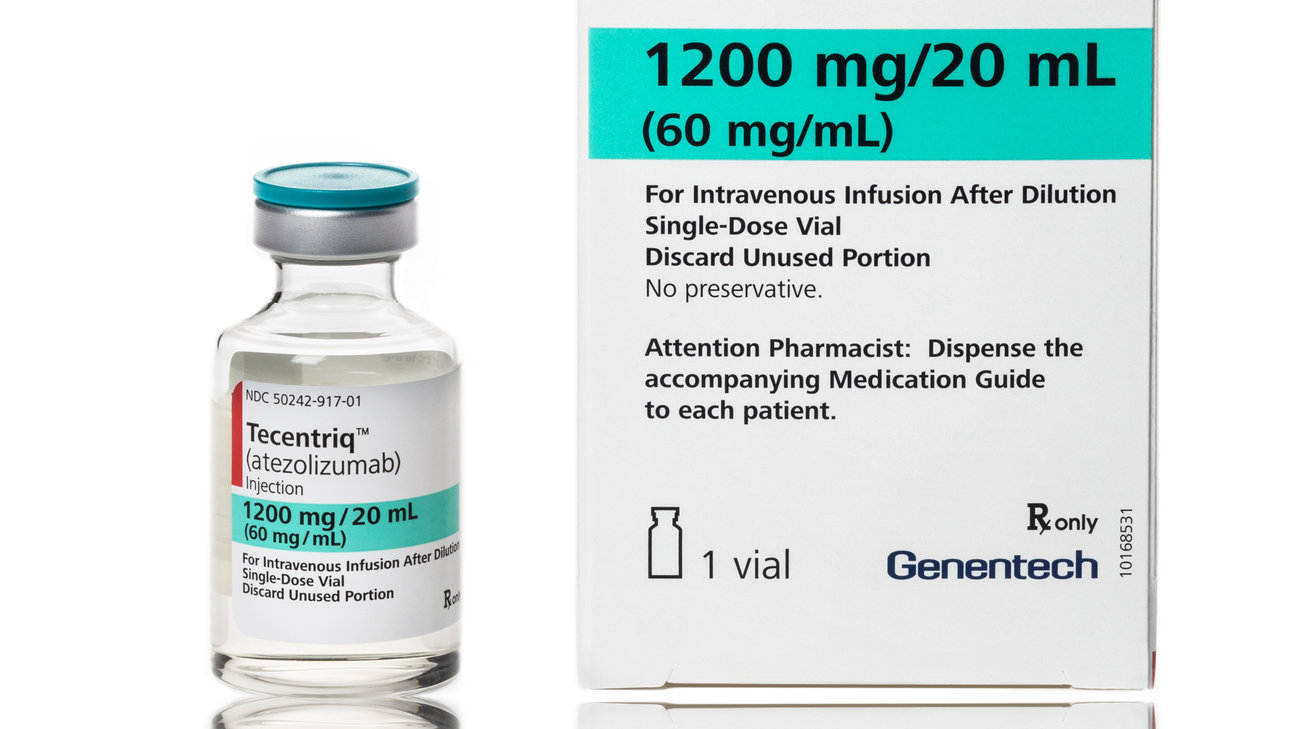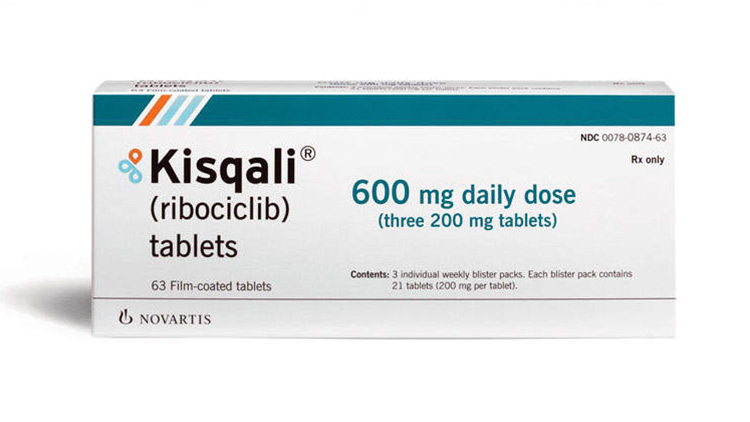Tecentriq (Atezolizumab) vs Kisqali (ribociclib)
Tecentriq (Atezolizumab) vs Kisqali (ribociclib)
Tecentriq (atezolizumab) is an immune checkpoint inhibitor designed to treat various types of cancer by enabling the immune system to recognize and combat cancer cells. It is commonly used for cancers such as non-small cell lung cancer, small cell lung cancer, urothelial carcinoma, and triple-negative breast cancer. On the other hand, Kisqali (ribociclib) is a CDK4/6 inhibitor indicated for the treatment of hormone receptor-positive, human epidermal growth factor receptor 2-negative advanced or metastatic breast cancer, often in combination with an aromatase inhibitor or fulvestrant. When deciding which medication is right for an individual, it is crucial to consider the specific type of cancer they have, as Tecentriq and Kisqali are approved for different indications and work through distinct mechanisms. A healthcare provider would assess the patient's cancer characteristics, overall health, and treatment goals before recommending one of these therapies.
Difference between Tecentriq and Kisqali
| Metric | Tecentriq (Atezolizumab) | Kisqali (ribociclib) |
|---|---|---|
| Generic name | Atezolizumab | Ribociclib |
| Indications | Urothelial carcinoma, non-small cell lung cancer, triple-negative breast cancer | HR-positive, HER2-negative advanced or metastatic breast cancer |
| Mechanism of action | PD-L1 inhibitor, immune checkpoint inhibitor | CDK4/6 inhibitor, antineoplastic |
| Brand names | Tecentriq | Kisqali |
| Administrative route | Intravenous infusion | Oral |
| Side effects | Fatigue, nausea, decreased appetite, urinary tract infection, fever | Neutropenia, nausea, infections, fatigue, diarrhea |
| Contraindications | None known | QT prolongation, liver impairment, electrolyte abnormalities |
| Drug class | Monoclonal antibody, Immune checkpoint inhibitor | CDK4/6 inhibitor |
| Manufacturer | Genentech (Roche) | Novartis |
Efficacy
Tecentriq (Atezolizumab) in Breast Cancer
Tecentriq (Atezolizumab) is an immune checkpoint inhibitor that has been studied for its efficacy in treating breast cancer, specifically in patients with triple-negative breast cancer (TNBC), which is a type of cancer that lacks the three most common types of receptors known to fuel most breast cancer growth—estrogen, progesterone, and the HER-2 gene. In this subset of breast cancer, Tecentriq has shown promise when used in combination with chemotherapy. In clinical trials, the addition of Tecentriq to chemotherapy has been associated with a significant improvement in progression-free survival (PFS) compared to chemotherapy alone. This benefit has been particularly observed in patients whose tumors express the PD-L1 protein, which is a target of Tecentriq's immune-modulating action.
Kisqali (Ribociclib) in Breast Cancer
Kisqali (Ribociclib) is a CDK4/6 inhibitor used in combination with an aromatase inhibitor or fulvestrant for the treatment of hormone receptor-positive, human epidermal growth factor receptor 2-negative (HR+/HER2-) advanced or metastatic breast cancer. Clinical trials have demonstrated that ribociclib effectively prolongs PFS in premenopausal and postmenopausal women with this type of breast cancer. When used as a first-line treatment in combination with letrozole, ribociclib has shown a significant improvement in PFS compared to letrozole alone. The efficacy of ribociclib has been consistent across various subgroups of patients, including those with visceral disease and those with bone-only disease.
Comparative Efficacy in Breast Cancer Treatment
While both Tecentriq and Kisqali are used in the treatment of breast cancer, they target different patient populations within this disease category. Tecentriq's efficacy is particularly notable in TNBC, a form of cancer that is historically difficult to treat due to the lack of targeted hormonal or HER2-directed therapies. On the other hand, Kisqali is tailored for HR+/HER2- breast cancer, which responds to hormone therapy. The efficacy of these drugs in their respective indications provides valuable options for personalized cancer treatment, addressing the unique characteristics of the patient's tumor biology.
Conclusion
In conclusion, both Tecentriq and Kisqali have shown efficacy in the treatment of breast cancer but are utilized for different subtypes of the disease. Tecentriq's combination with chemotherapy for TNBC and Kisqali's combination with hormone therapy for HR+/HER2- breast cancer represent significant advances in the management of these challenging conditions. The continued evaluation of these medicines in ongoing clinical trials and in real-world settings is crucial to further understanding their long-term efficacy and to optimize treatment strategies for patients with breast cancer.
Regulatory Agency Approvals
Tecentriq
-
European Medical Agency (EMA), European Union

-
Food and Drug Administration (FDA), USA

-
Health Canada

-
Pharmaceuticals and Medical Devices Agency (PMDA), Japan

-
Therapeutic Goods Administration (TGA), Australia

-
Medsafe (NZ)

Kisqali
-
European Medical Agency (EMA), European Union

-
Food and Drug Administration (FDA), USA

-
Health Canada

-
Therapeutic Goods Administration (TGA), Australia

-
Medsafe (NZ)

Access Tecentriq or Kisqali today
If Tecentriq or Kisqali are not approved or available in your country (e.g. due to supply issues), you can access them via Everyone.org.
How it works

Make an enquiry
Choose the medicine you want to buy, answer a couple of questions, and upload your prescription to speed things up. We’ll get back to you within 24 hours.


Make an enquiry
Choose the medicine you want to buy, answer a couple of questions, and upload your prescription to speed things up. We’ll get back to you within 24 hours.


Breeze through the paperwork
We'll guide you through the required documents for importing unapproved medicine, ensuring you have all the necessary information.


Get a personalized quote
We’ll prepare a quote for you, including medicine costs and any shipping, administrative, or import fees that may apply.


Receive your medicine
Accept the quote and we’ll handle the rest - sourcing and safely delivering your medicine.

Some text on this page has been automatically generated. Speak to your physician before you start a new treatment or medication.
Let's talk
If you have any questions, call us or send us a message through WhatsApp or email:
Contact us




